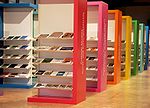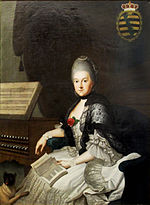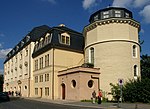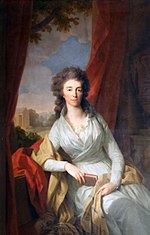Weimar Classicism (German: Weimarer Klassik) was a German literary and cultural movement, whose practitioners established a new humanism from the synthesis...
22 KB (2,609 words) - 19:42, 2 December 2024
Classicism, in the arts, refers generally to a high regard for a classical period, classical antiquity in the Western tradition, as setting standards for...
19 KB (2,353 words) - 12:17, 1 October 2024
Johann Wolfgang von Goethe (category People from Weimar)
Martin Wieland, and that formed the basis of Weimar Classicism. He was ennobled by the Duke of Saxe-Weimar, Karl August, in 1782. Goethe was an early participant...
102 KB (11,590 words) - 04:00, 27 December 2024
figures of Weimar Classicism, Johann Wolfgang von Goethe and Friedrich Schiller. In the 19th century, composers such as Franz Liszt made Weimar a music centre...
63 KB (6,981 words) - 10:25, 2 December 2024
Herder, and made their residence in Weimar an important cultural center in an era referred to as Weimar Classicism. In 1804, Duke Charles Augustus entered...
13 KB (1,254 words) - 15:39, 22 December 2024
German literature (section German Classicism)
Sturm und Drang / Storm and Stress (1760s–1780s) German Classicism (1729–1832) Weimar Classicism (1788–1805) or (1788–1832), depending on Schiller's (1805)...
32 KB (3,392 words) - 21:59, 20 December 2024
the Weimar Classicism movement, and the architecture of the sites across the city reflects the rapid cultural development of the Classical Weimar era...
4 KB (307 words) - 14:57, 6 June 2023
their period of association with it by initiating what would become Weimar Classicism. French neoclassicism (including French neoclassical theatre), a movement...
32 KB (4,271 words) - 03:49, 20 December 2024
Friedrich Schiller (section Weimar and later career)
these discussions led to a period now referred to as Weimar Classicism. Together they founded the Weimar Theater. They also worked together on Xenien, a collection...
42 KB (4,441 words) - 22:38, 3 December 2024
Neoclassicism (redirect from Neo-classicism)
Neoclassicism, also spelled Neo-classicism, emerged as a Western cultural movement in the decorative and visual arts, literature, theatre, music, and architecture...
118 KB (14,105 words) - 23:43, 20 December 2024
still unsettled, the delegates met at Weimar. Ebert wanted the victorious Allies to be reminded of Weimar Classicism, which included the writers Goethe and...
52 KB (6,387 words) - 09:49, 18 December 2024
Duchess Anna Amalia of Brunswick-Wolfenbüttel (redirect from Anna Amalia Duchess of Saxony-Weimar-Eisenach)
invitation of Abel Seyler's theatre company in 1771 marked the start of Weimar Classicism, that would include such figures such as Wieland, Goethe, Herder and...
11 KB (979 words) - 14:50, 4 October 2024
Johann Gottfried Herder and Friedrich Schiller to Weimar, thus laying the foundation for the Weimar Classicism circle, which was supported in the background...
28 KB (2,740 words) - 13:41, 27 November 2024
critic. He is associated with the Enlightenment, Sturm und Drang, and Weimar Classicism. He was a Romantic philosopher and poet who argued that true German...
43 KB (5,312 words) - 07:11, 18 November 2024
movement of proto-Romanticism. Weimar Classicism (Weimarer Klassik) was a cultural and literary movement based in Weimar that sought to establish a new...
178 KB (22,242 words) - 13:49, 22 December 2024
politically dominated by the northern Kingdom of Prussia, and Weimar Classicism in the Duchy of Saxe-Weimar became the expression of German national high culture...
18 KB (1,932 words) - 13:16, 23 October 2024
Das Göttliche (The Divine) is a hymn in the Weimar Classicism style written by Johann Wolfgang von Goethe. It was composed in 1783, and first appeared...
4 KB (117 words) - 11:11, 15 November 2024
movement of proto-Romanticism. Weimar Classicism ("Weimarer Klassik") was a cultural and literary movement based in Weimar that sought to establish a new...
32 KB (4,113 words) - 13:00, 10 November 2024
developed relatively early, and, in the opening years, coincided with Weimar Classicism (1772–1805). The early period, roughly 1797 to 1802, is referred to...
14 KB (1,487 words) - 15:39, 21 October 2024
funding Goethe and the foundation of the Weimar Princely Free Drawing School and encouraging Weimar Classicism.[citation needed] Critics praised his judgment...
18 KB (1,704 words) - 21:28, 31 August 2024
Caroline von Wolzogen (section Weimar literary life)
Rudolstadt – 11 January 1847, Jena), was a German writer in the Weimar Classicism circle. Her best-known works are a novel, Agnes von Lilien, and a...
12 KB (1,422 words) - 15:28, 31 August 2024
developed relatively late, and, in the early years, coincided with Weimar Classicism (1772–1805); in contrast to the seriousness of English Romanticism...
29 KB (3,580 words) - 05:10, 10 November 2024
literary circles of Weimar. She became friendly with Charlotte von Stein, who was at the center of the circle of Weimar Classicism as a friend of Schiller...
6 KB (707 words) - 14:07, 11 October 2024
German theatre practitioner, playwright, and poet. Coming of age during the Weimar Republic, he had his first successes as a playwright in Munich and moved...
94 KB (11,937 words) - 06:48, 22 December 2024
collections, a number of which are World Heritage Sites. It focuses on the Weimar Classicism period (most famously associated with Johann Wolfgang Goethe and Friedrich...
4 KB (390 words) - 14:18, 22 October 2024
Weimar culture was the emergence of the arts and sciences that happened in Germany during the Weimar Republic, the latter during that part of the interwar...
55 KB (6,922 words) - 16:48, 18 December 2024
Duchess Anna Amalia Library (redirect from Weimar library fire)
Duchess Anna Amalia Library (German: Herzogin Anna Amalia Bibliothek) in Weimar, Germany, houses a major collection of German literature and historical...
12 KB (1,139 words) - 06:22, 26 November 2024
personally redesigned by Goethe once he arrived in Weimar to reflect the ideals of the burgeoning Weimar Classicism movement, in which Goethe was especially prominent...
3 KB (255 words) - 01:46, 29 May 2024
same time his most enigmatic,[citation needed] combines elements of Weimar Classicism, such as the plot layout as a scientific parable, with an opposing...
21 KB (2,802 words) - 10:09, 5 June 2024
Princess Louise of Hesse-Darmstadt (1757–1830) (category Grand duchesses of Saxe-Weimar-Eisenach)
grand-duke) Charles Augustus of Saxe-Weimar-Eisenach and as such a member of the court sphere of Weimar Classicism. She was held to be serious and introverted...
14 KB (1,397 words) - 12:25, 22 November 2024




























